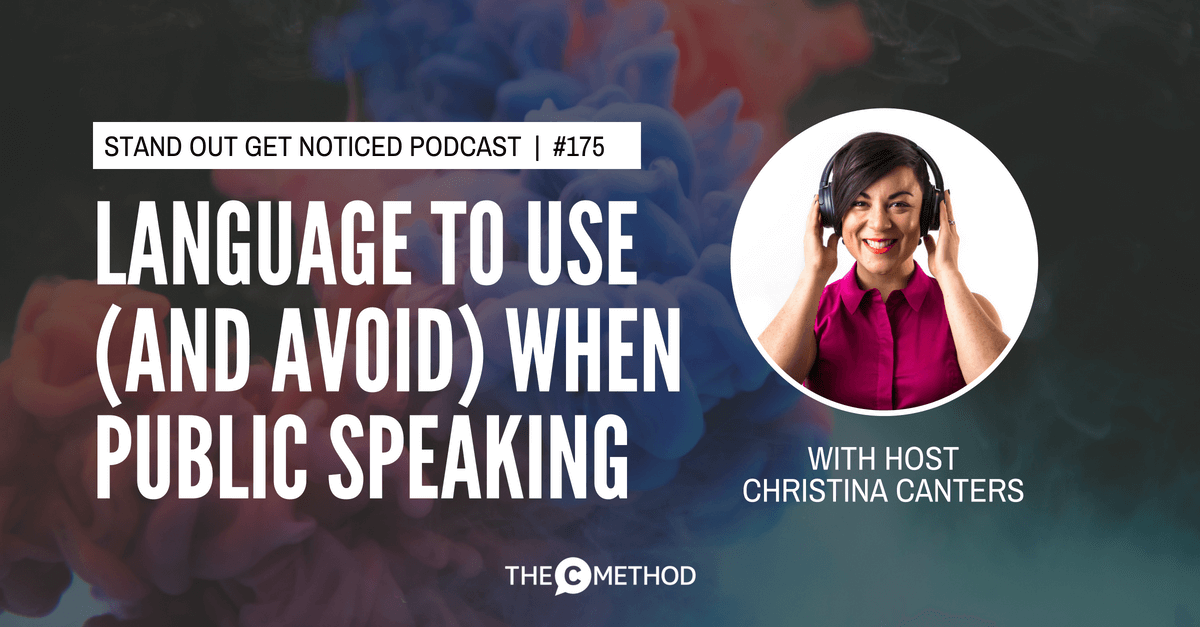
How much thought do you give to your language when speaking?
And I’m not talking about whether to drop an F-bomb or not.
I’m talking about the language we use day to day – whether in conversation, running a meeting or presenting to a group. You may not realise it, but our language plays a key role in influencing how we think, how others respond to us, and how we are perceived.
For example, if I were to say to you:
“You must be mistaken.”
“You are wrong.”
“You are lying.”
Even though each sentence communicates “I don’t believe what you’re saying”, you would likely have a very different response to each one – and all I changed was the language.
In this episode, we look at 7 common language patterns to avoid, specifically when public speaking. I also share what you can replace these patterns with to help you be a more confident, persuasive and effective speaker.
My goal for this episode is for you to be more aware of the language you use day to day, to pick ONE pattern to focus on and start replacing with new language that helps you have more influence and confidence when you speak.
Language patterns to avoid:
1. Filler words, including: “umm”, “ahh”, “like”, “so”, “you know”, “and”, and any other word you lean on as a ‘crutch’ when you’re trying to fill in silence.
2. Poor expressions, including: “kind of”, “sort of”, “basically”, “pretty much”, “really” (and my favourite Aussie expression: “yeah nah”). None of these add anything to your speech, and muddy your message.
3. Doubting language, for example starting sentences with “I guess”, “I suppose”. If you believe something, then say it like you believe it. Don’t guess yourself! Instead, say: “In my experience, I’ve found…”
4. Belittling words, including “just”, “only”, “little”. For example: “I’m just a junior designer”, “I only have 6 months experience”, “I have a little business”. Language like this erodes your confidence over time. Practice removing these words completely from your vocabulary!
5. Jargon. Sometimes we speak in convoluted language to “sound smart”. Would you rather sound smart or have your audience actually understand what you’re saying? Instead of focusing on yourself and your desire to impress others, turn your focus to your audience and make it easy for them to receive your message.
6. “Telling” language, including “Today I’m going to tell you…” or “Today I’m going to talk about…” There WILL be people in the audience who think to themselves “Um, no you’re not. You can’t tell me anything!” Instead, make it about the group. Say “Today we are going to explore…” or “We are going to discover…” Your presentation will feel much more inclusive, like you’re “in it together”, as opposed to it being “me telling you”.
7. Apologies. This includes apologising for slides the audience can’t read (why did you put it in?), telling the audience you’re not a good speaker (thanks, now we’re picking for mistakes), telling the audience you’re getting over a cold (we don’t care), and telling the audience you’re nervous (we couldn’t tell…until now).
Links mentioned in the episode:
- Podcast: Watch Your Language! How words can impact your confidence
- Podcast: How to suck less at explaining what you do
What is a language pattern you commonly use in your speech? Come on over and join the discussion on Facebook, where we have a community of podcast listeners who are dedicated to supporting each other in their speaking and communication journeys. We’d love to have you! Click here to join the Facebook group The C Method Rockstars.
Leave a Reply